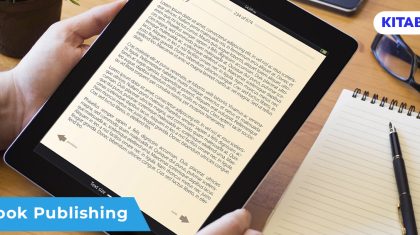The Impact of Publisher Software on the Efficiency of the Educational Publishing Process
A robust educational publishing industry is a key component of a knowledge-based, competitive economy. Academic institutions across the globe are embracing the transition to digital tools to raise academic standards.
Digital learning technology has made it possible to develop BYOD (bring your own device), mobile learning, and MOOC (massive open online courses) to deliver interactive and effective learning experiences.
What is the role of publisher software in this evolving digital environment? Publisher software or digital publishing platforms are tools that bring digital content to life.
In this article we’ll explore how these software platforms have streamlined the educational publishing process.
How Does Publisher Software Enhance the Educational Publishing Industry?
Though digital educational publishing is in its early stages, the variety, volume, and quality of interactive digital content is rapidly growing.
Here’s how publisher software is enhancing the educational publishing industry to deliver smarter education goals.
Flexible Learning Environment
Digital publishing creates a blended learning environment that combines online learning with face-to-face tutoring. This offers a great deal of flexibility in the delivery of subject-matter while still allowing for the personalized feel of in-class tuition.
This blended learning approach enables learners to acquire knowledge outside the classroom via videos, documents, recorded lectures, and other resources and apply the same knowledge within the class.
Online learning platforms make it easier for professors to conduct assessments and give personalized feedback to learners. Digital learning also provides an equal learning opportunity to differently-abled learners by communicating content via different media.
More Resources with Full-Time Access
In today’s digital world, knowledge is freely available and up to date. The online learning approach grants learners’ easy access to content across an unlimited range of topics.
The best part is that learners have 24*7 access to the learning content. This enables them to take ownership of their learning journey, do their research without being hand-held, and manage their schedule.
Learner-Centric
Publisher software enables the creation of mLearning and eLearning modules. These modules allow learners to study at their pace in a stress-free manner without any interruption.
They also allow instructors to personalize content and tailor them to the varied needs of their learners.
Digital publishing platforms also grant learners access to recorded lectures for their reference, speeding up the entire learning process. Furthermore, they support shared documents and video conferencing, enabling learners to collaborate and study in a shared environment.
Drives Deeper Learner Engagement
The main purpose of digital content is to drive maximum learner engagement. The digital learning platform eliminates clutter, offering a fine-tuned learning experience that keeps the learners hooked and more responsive to the learning material.
In today’s world of online scrolling and endless social media feeds, readers lack a sense of completeness. Valuable time is lost, and questions are left unanswered, resulting in unsatisfied readers.
The online learning platform resolves these feelings. Providing a fine-tuned learning experience instills a feeling of completeness into learners. They receive interactive and direct content through multimedia like infographics, enticing text, and videos.
Digital Assessments to Track Learner’s Progress
Assessing learners’ strengths and weaknesses and tracking their progress is much easier in a digital learning environment.
From individual assessments and examination results to attendance records, digital learning platforms offer an online record of information that can be easily accessed and viewed at a glance.
This enables teachers to track learners’ general progress, understand their learning patterns, and identify areas that learners need help with.
Cutting Expenses
Digital publishing is pocket-friendly and excludes excess costs, helping publishers earn more revenue. From paper costs, print editions, and shipping charges to printer charges and cover page illustration charges, a lot of money is spent on publishing a physical book.
On the other hand, digital publishing eliminates many of these traditional publishing processes. It also reduces marketing costs significantly as digital content effortlessly attracts learners.
Furthermore, publishers need not worry about shipping costs because the content can be easily accessed on different devices.
Gamification
Another great benefit of the online learning platform is that it can incorporate easy-to-use digital tools into the course design. Based on the gaming model, these tools can be used to motivate learners through badges, real-time feedback, and rewards.
When learners are acknowledged for regular achievements, it motivates them to continue. They can set goals for themselves when they have a clear roadmap through their learning journey.
In addition to rewards for excellent test scores, games-based learning also provides recognition for good learning behaviors like conducting independent research and participating in discussions.
Facilitates Editing Post Publication
Humans make mistakes, and content creators are no exception. Unlike print publishing, digital publishing facilitates continuous updates or rectification of errors to ensure the content is free of errors.
While it is costly to republish a physical book, digital content can be easily edited or updated even after publication.
Wrapping Up
At times, technology can be a human’s best friend. Digitalization is everywhere. From cookbooks, magazines, and textbooks, to novels, newspapers, etc., everything has moved to digital.
It’s no wonder that educational publishers are harnessing the power of digital technologies that integrate assessment, instruction, and performance data management into linked learning environments.
KITABOO is a comprehensive digital publishing platform that helps educational publishers and corporates create interactive eBooks. With advanced features and a dedicated team of experts, the platform enables them to keep up with the changing trends and create an exceptional online learning experience for learners.
Discover how a mobile-first training platform can help your organization.
KITABOO is a cloud-based platform to create, deliver & track mobile-first interactive training content.


